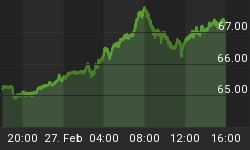Below is an excerpt from a commentary originally posted at www.speculative-investor.com on 3rd September 2009.
China's government follows a mercantilist trade policy, meaning that it attempts to manipulate international trade -- via tariffs, subsidies, regulations and exchange rates -- in order to maximise the amount of money that flows into the country. This policy is unlikely to change anytime soon. Also, China's government exerts very direct and stringent control over its banking system, as evidenced by the rapid expansion of bank credit during the first half of this year at the behest of the government, and the subsequent slowing in the rate of credit expansion, again at the behest of the government. Thanks to its domination of the banks, China's government has a level of control over money supply that central-planners in the US and Europe can only dream about.
Chinese policymakers will not willingly relinquish the influence they now enjoy over the internal Yuan supply and the value of the Yuan relative to other currencies. For this reason, the increasingly popular notion that China plans to back the Yuan with gold, or link the Yuan's value to gold in some way, makes no sense at all.
The probability that there will be some sort of official link between China's currency and gold anytime soon is very close to zero, and the same can be said about every other national currency. Unfortunately, the current major trend is for increasing, not decreasing, government control over banking and money.
Another consideration is that it would be practically impossible for any single country, with the exception of the US, to link its currency to gold, because if all the other currencies remained free-floating/sinking then the exchange rate of the gold-linked currency would experience wild swings in response to changes in the US$ gold price. For example, a doubling of the US$ gold price over 12 months followed by a one-third decline over the ensuing 12 months would effectively cause the international prices of the gold-linked country's exports to double and then plunge over a 2-year period. That is, international trade could become extremely unstable for the lone country with the gold-linked currency. The US is the exception because a large chunk of international trade is conducted in US dollars. As a result, if the US were to link its currency to gold then the rest of the world would be forced to follow suit. This means that the US would have to be the first country to establish a gold link.
Many years into the future there will come a time when our present monetary system is so ravaged by inflation that a complete system change will be unavoidable. At this future time the reintroduction of an official monetary role for gold could become a realistic possibility.
Rather than having a Gold Standard or some other official (government-mandated/controlled) link between the currency and gold, the optimum solution would be for the government to get out of the money business altogether and let the market use whatever money it chooses to use. The trouble is, the optimum solution is so far outside the realm of mainstream thinking that it won't even find its way to the discussion table until after there is a total monetary collapse.
We aren't offering a free trial subscription at this time, but free samples of our work (excerpts from our regular commentaries) can be viewed at: http://www.speculative-investor.com/new/freesamples.html.















